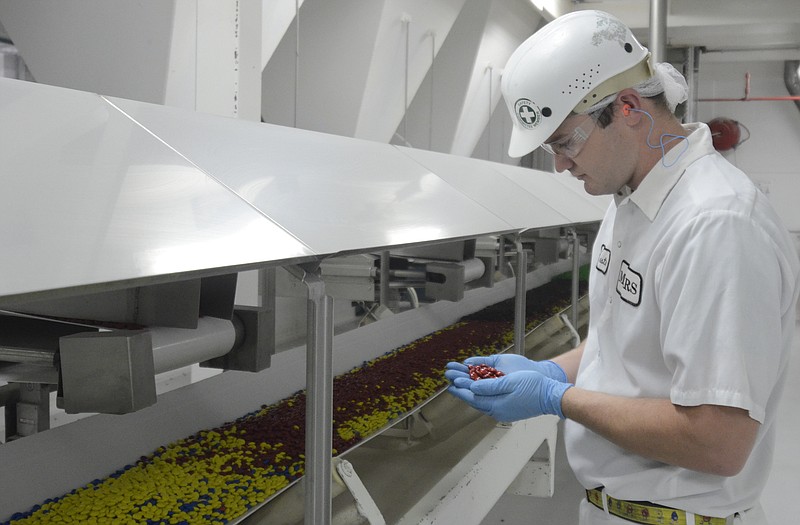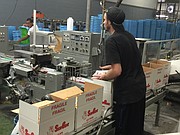Tennessee's sweet spot
In the Cleveland and Collegedale area, more than 4,000 persons work in the snack, soft drink and food processing industry. Major employers include: * McKee Foods in Collegedale, the nation's biggest privately owned bakery, makes Little Debbbie snacks and employs 2,800 workers. * Mars in Cleveland, maker of Twix and M&Ms, has 575 employees * Flowers Bakery in Cleveland, maker of Tastykakes, has 265 employees * Newlywed Foods in Cleveland, maker of premium batters, breadings, coatings, spices and seasonings for the processed food industry, has 220 employees * Coca-Cola Bottling in Cleveland, one of the first soft drink bottlers, has 180 employees * Fun Treats Inc., in Cleveland, maker of ice pops, employees up to 50 seasonal workers during peak periods Source: Cleveland/Bradley County Chamber of Commerce
When the investors in a new ice pop were looking for a production site 27 years ago, they soon targeted Cleveland, Tenn., as a site to easily serve the eastern half of the United States.
Cleveland and nearby Collegedale, Tenn., were already home to the nation's biggest privately held snack bakery and two of the world's first soft drink bottling plants. In addition to a supply of trained labor, the area also boasts cheaper energy, water and taxes and is located within a day's drive of nearly half of the U.S. population.
"I was from East Tennessee so it seemed like an ideal place," said John Allman, general manager for Fun Treats Inc., which makes a variety of ice pop treats for its own and other private label businesses. "Cleveland has proven to be a good place for our business, which is probably why you see so many others in food processing in this area."
Although Cleveland isn't in the middle of America's breadbasket of the Midwest where most corn, wheat and soybeans are grown, it does boast America's lowest costs and best labor pool for food processing industries needing cheap energy, water, transportation, taxes and labor, according to a new industry study of two dozen food production cities by the Princeton, N.J.-based consulting firm, The Boyd Co. Inc.
Boyd estimates the annual operating costs for a hypothetical 300,000-square-foot food processing facility with 500 employees in Cleveland was 14 percent cheaper than Chicago and more than 20 percent cheaper than San Francisco - the most expensive U.S. city in the study.
"State business climate factors trump the proximity of agricultural and other raw materials," said John Boyd, the principal for The Boyd Co. Inc. who conducted the site analysis for its food processing clients. "Intermodal rail allows the raw products to be brought to a plant at a very efficient cost. You want to do the production in a right-to-work state with low business costs and the requisite skill sets and that is what Cleveland and Southeast Tennessee offer both existing and potential new businesses."
Those advantages have already helped Southeast Tennessee land more than 4,000 food and beverage manufacturing jobs, including more than 2,800 jobs at the corporate headquarters of the Collegedale-based McKee Foods Corp., the nation's biggest independent bakery and maker of the No. 1 snack cake in America, Little Debbie.
Other major players include Mars, which makes its U.S. supply of M&Ms and Twix candy bars in Cleveland, and Flowers Bakery, which makes TastyKakes and other bread and snack items. Coca-Cola Enterprises operates major soft drink bottling plants in both Chattanooga and Cleveland.
Food processing is an industry that generates more than $1 trillion of sales around the globe every year, Boyd said. New food regulations are creating more new investments and relocation activity as companies try to comply with requirements of the new Food Safety Modernization Act, which requires registered food facilities that manufacture, process, pack or hold food to do more to ensure the integrity and safety of their products.
The new food safety regulations may take a bite out of the profits of some food processors forced to take extra steps to verify the safety of their products. But Boyd said it also may create some new market opportunities for Southeast Tennessee as food companies reshuffle operations and look to locate in lower cost areas.
Boyd said food processing "is one of the top advanced manufacturing industries for movement and investment" in coming years as companies adapt to the new regulations.
As a result, Cleveland recruiters are targeting food processing for future growth in the area.
"Food processing is definitely an industry cluster that has grown and will likely continue to grow," said Doug Berry, vice president of economic development for the Cleveland/Bradley County Chamber of Commerce. "We're eager to attract more industry in food production and we hope we can use this study to focus in and develop some very targeted marketing efforts to help grow this sector."
Eastern Ontario proved to be the lowest cost region for food processing in North America, due to both a favorable currency exchange and the greater amount of free trade agreements in Canada (40 other countries) compared with the U.S. (which has about 20). Without the federal price supports provided by the U.S., Canadian sugar prices are less than half what that raw material costs in the United States.
"Companies are more likely now to look north of the border," Boyd said, noting that both Kellogg and Nestlé have opened food plants there in recent years.
"Eastern Ontario is predominantly a right-to-work area [with few unions] and, just like Tennessee, leverages its right-to-work status to its advantage. We're seeing more businesses move to Eastern Ontario as a result."
Contact Dave Flessner at dflessner@timesfreepress.com or at 423-757-6340.

